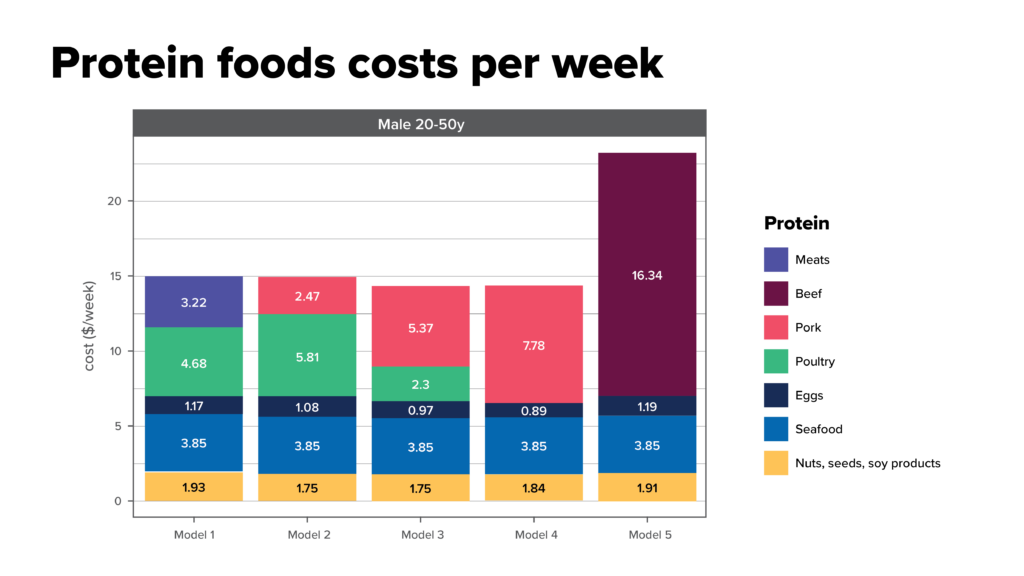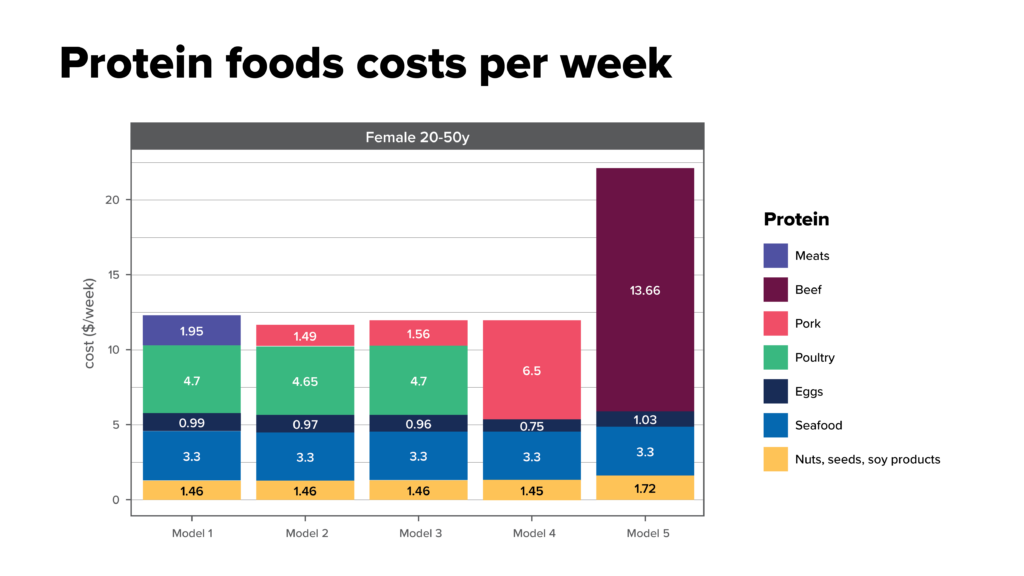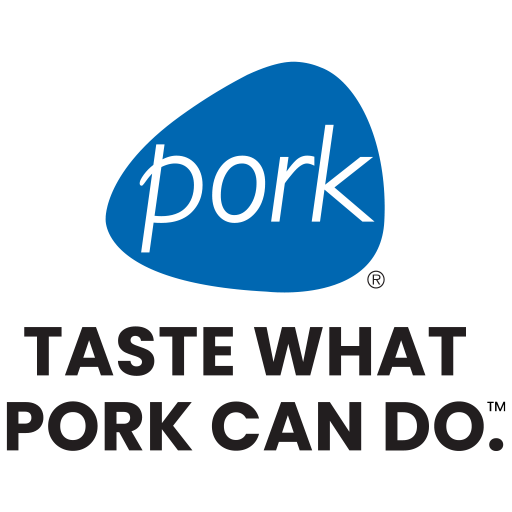Research
Explore the latest research from the National Pork Board, including studies on human nutrition and the important role pork plays as part of a healthy diet.
Study Shows Pork Fits in Nutritious Diet at Lower Cost
A new modeling study that examines the role of fresh pork in the revised Thrifty Food Plan (TFP), which provides a realistic cost estimate for achieving a healthy diet on a limited budget. The study shows that fresh pork is a high-quality, nutrient dense protein that fits into the lowest-cost healthy diet, meeting all the nutrient requirements and dietary guidelines.
The research revealed that:
- Pork can fit into a nutritious diet at a lower cost
- Selecting pork as the only source of meat protein in the TFP reduced the weekly cost below the current TFP cost levels
- Selecting pork as the only source of protein still allowed for nutrient-adequate diets in the TFP
There were a couple of study limitations, including:
- This was not an intervention or feeding study, so results cannot be used to suggest cause and effect.
- While the results are promising, the eating plans modeled in this study that feature pork need to be tested in reference households to assess if they are feasible to follow over the long-term.
The research emphasizes the value of fresh, lean pork as a cost-effective option for families looking to eat healthy on a budget. Read the full publication and discover how fresh pork can play a vital role in helping Americans of all ages eat healthy on a budget in a way that works for them.



Nutrient-Rich Lean Pork
Choosing fresh, lean pork is a delicious option to improve intake of protein and variety of essential vitamins and minerals. As this study shows, the consumption of these beneficial nutrients can be achieved while minimizing intakes of energy, saturated fat, and sodium. Learn more about this research to help your patients or clients eat more nutritious meals!
TMAOs Response & Pork
You’ve probably heard about TMAO (Trimethylamine-N-oxide) recently. Recent research has shown that consuming pork as the main protein within an omnivorous eating pattern that is aligned with the Dietary Guidelines for Americans does not exacerbate TMAO response. Learn more about this interaction and stay updated with the latest science!
Lean Pork in the DASH Diet
As the most-consumed protein worldwide, pork has a place in various eating patterns, including the popular Dietary Approaches to Stop Hypertension (DASH) diet. Including fresh, lean pork in the DASH diet is a delicious way to increase consumption of fruit, vegetables, and whole grains, while reducing blood pressure. Read more about this research and learn how it can benefit your patients and clients.
Pork in a Plant-Forward Diet
Gut health is top-of-mind for many health professionals and consumers alike. Research indicates that healthy young adults who follow a plant-forward Healthy U.S.-Style Dietary Pattern based on the Dietary Guidelines for Americans that includes 3 ounces of lean or processed pork may experience positive impacts on some markers of gut health and cardiovascular disease risk factors. Learn more about the benefits of adding pork to a healthy, plant-forward diet.
Pork in Plant-Forward Diets Makes Meals More Appealing
Not all proteins are created equal—especially when it comes to quality and digestibility. In a recent study, pork-based meals had a significantly higher protein quality score than those made with plant proteins alone, making them especially beneficial for older adults. Participants also reported greater satisfaction, satiety, and long-term interest in diets that combined pork with plants. Read more about how these findings support the value of including high-quality animal protein in balanced, sustainable eating patterns.


Pork Intake and Nutrient Adequacy Across Racial/Ethnic Groups
Did you know pork may help close key nutrient gaps in multicultural populations? Black and Hispanic adults who include pork in their diets are less likely to fall short on essential nutrients like iron, zinc, thiamine, choline, iron and potassium. Learn how these findings highlight how pork can play a role in supporting better nutrition in diverse communities.
Pork Consumption and Health in Korean Older Adults
In a study from Korea, pork consumption was linked to better overall diet quality, higher nutrient intake, and improved muscle health. Pork eaters had stronger handgrip strength, greater protein intake, and higher Korean Healthy Eating Index scores—plus they tended to eat more vegetables, showing how pork fits naturally into balanced, culturally-relevant meals. Learn more about how these findings highlight pork’s role in supporting healthy aging and nutrient-rich diets.
Pork as Sustainable Protein Source
Curious how pork stacks up on sustainability? New research shows pork performs similarly to poultry, seafood, eggs, and legumes across key indicators like land use, fertilizer, and pesticide needs. The biggest environmental impact came when pork replaced beef—leading to significant reductions in greenhouse gas emissions and resource use. See how these findings highlight pork’s potential role in more sustainable food choices
Pork’s World of Flavors
Sensory science reveals why pork pairs so effortlessly with fruits, vegetables, and global cuisines. Researchers identified 111 unique flavor nuances in pork—including sweet, floral, nutty, and umami-rich tones—making it one of the most versatile proteins on the plate. Lean pork was found to have the most intense umami flavor, while both lean and higher-fat cuts offered a rich “kokumi” taste, enhancing the overall eating experience. These findings support pork’s role as a flavorful, culturally adaptable, and nutritious protein. Read more to explore pork’s flavor potential.


Pork and Military Fitness Recovery
Did you know the type of protein you eat may impact your recovery? New research found that cadets who consumed pork-based MREs had lower markers of muscle breakdown, stress, and inflammation—plus less post-exercise soreness—compared to those on plant-based MREs. Pork eaters also showed a more favorable hormonal profile and better appetite satisfaction, with some even reporting improved sleep quality. Explore how pork may support recovery and performance in physically demanding settings!

